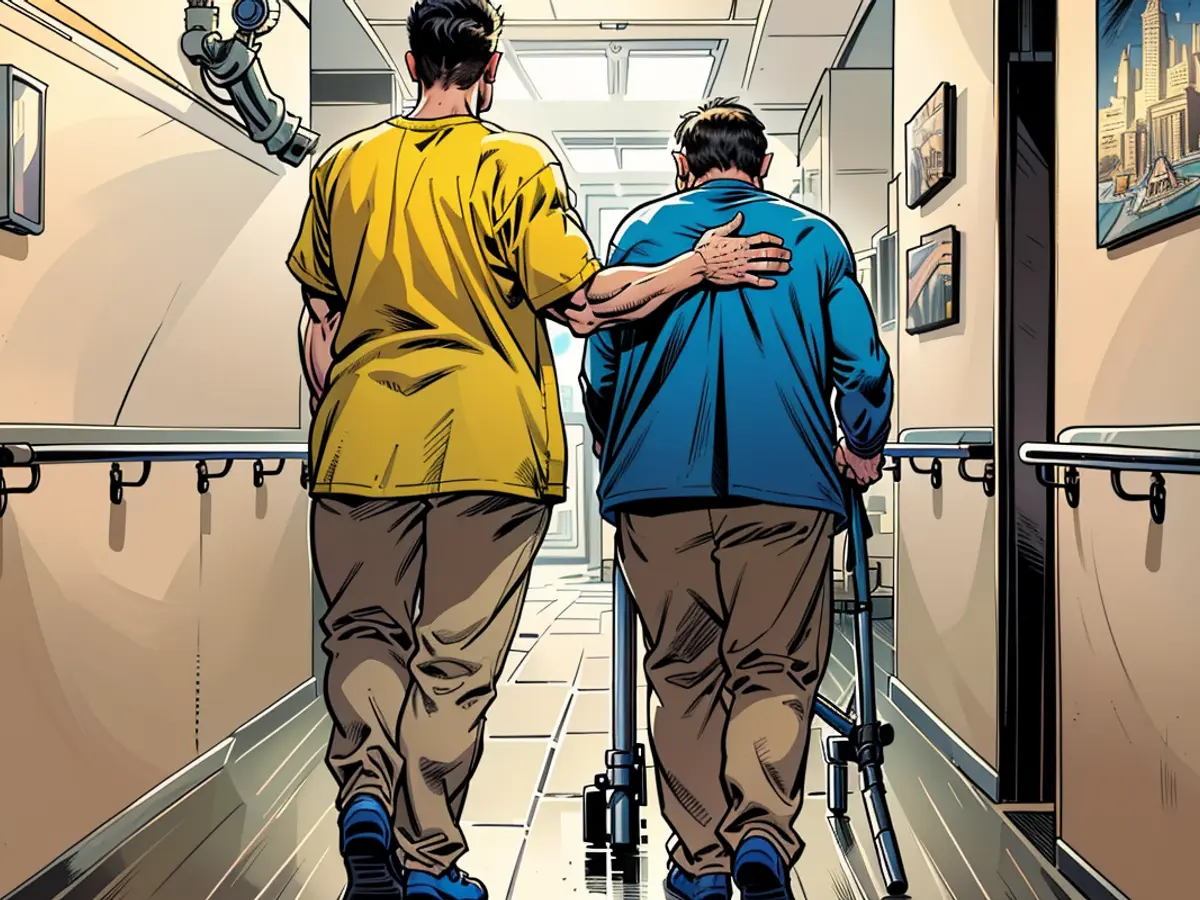Care in need - Experts call for rapid reforms in the care sector
Nursing homes and home care services have to reject applicants, social services cannot provide follow-up care, and the existing personnel is working at their limit: Representatives from the Nursing Homes Association, the State Nursing Chamber, the Social Association VdK, and from practice paint a grim picture of the situation in Rhineland-Palatinate. They urgently demand reforms from the state government and the nursing insurance funds. "We need emergency surgery before rehabilitation," said the chairman of the Nursing Homes Association Gerhard Lenzen in Mainz.
"The crisis only affects us, but not the nursing insurance funds and the state," Lenzen's colleague Jutta Schier added and demanded that everyone pull together. A joint position paper, which is over a year old and contains solution proposals from the industry, has not yet led to concrete improvements, Lenzen criticized. It's not enough to talk about models and projects anymore, it's necessary to work on bold solutions together, said Sebastian Rutten from the Nursing Homes Association.
The designated Minister-President Schweitzer appeals to the Federal Government
The outgoing Social Minister and future Minister-President Alexander Schweitzer sees the Federal Government as being in the wrong. "We are facing a turning point in nursing care," said the SPD politician. A fundamental nursing care reform is "urgently necessary and should not be postponed any longer." The next federal government must make this reform a priority. "The current government should also already create better conditions for nursing care now." As an example, he mentioned more flexible nursing care arrangements between ambulatory and stationary care. "A crucial and necessary step is the further development of nursing insurance to a full insurance."
The offer is getting scarcer
"The waiting lists are getting longer and longer," said Lenzen. Desperate beneficiaries turned to care facilities and had to find out that they could not be helped, reported Regina Bernhart from the Caritas Association Speyer.
There is a shortage of skilled labor and the existing nurses and nursing assistants are so overloaded that they are on average 32 days a year unable to work, said Lenzen. The financing of the institutions is based on 95% occupancy, but this is decreasing further because of the lack of personnel. Insolvencies and tasks are the result: "The already scarce offer is further reduced."
"Nursing care is in a serious crisis," Lenzen concluded. The demographic development will further aggravate the "critical situation," the skilled labor shortage, and the need for nursing care.
Call for bureaucracy reduction
The President of the Nursing Chamber, Markus Mai, demanded a drastic reduction in bureaucracy for nursing staff. "We are experiencing a significant culture of mistrust." Nursing services should be able to digitally enter data first, then print it out and submit it to the nursing insurance funds before they receive their money, criticized he.
Much more respect is needed for the professionals and harsher penalties for fraudsters in the industry. Mai also sees the Federal Government as being responsible for quick improvements. If nothing sustainable improves at the federal level, the states and the municipalities have no room for maneuver.
Waiting times are getting longer
Moritz Ehl from the Social Welfare Association VdK referred to the fact that 17 out of 20 care-dependent individuals in Rhineland-Palatinate would be cared for at home. This is often a significant burden for the family members, leading to further problems such as fewer employable women, therefore fewer specialists in other professions, and pensioner poverty for caregivers. Caregiver family members often find no help or find themselves in financial distress. At the same time, the cost of home care is increasing, reaching up to 3,000 to 3,500 Euros per month, according to Lenzen.
Klaudia Klaus-Höhl from the Bruderkrankenhaus in Trier stated that wait times for rehabilitation - for instance, after a stroke - were becoming longer. Some places were no longer being visited by care services due to staff shortages. Social welfare offices often needed half a year to clarify financing for the needy. She urged for the structures for well-trained personnel from abroad to be simplified urgently to help alleviate the personnel shortage.
Bernhart from the Caritas Association reported on long wait times for logopedists, physiotherapists, and ergotherapists. Old people also found no new family doctor when moving. Not only in rural areas but also in cities like Ludwigshafen, the offer for meals on wheels was much too thin.
The employees in care facilities were often a valve for the despair, grief, and anger of care-dependent individuals and their families, reported Bernhart. Verbal attacks and at times dangerous situations were the consequence.
- The situation in Rhineland-Palatinate's nursing homes and home care services is critically discussed in Mainz, with representatives from various associations urging the state government and nursing insurance funds for reforms.
- Alexander Schweitzer, the SPD politician and future Minister-President of Rhineland-Palatinate, criticizes the Federal Government for not prioritizing a fundamental nursing care reform, which he considers necessary to address the crisis.
- According to Gerhard Lenzen, chairman of the Nursing Homes Association, the existing personnel is overworked and unable to work on average 32 days a year due to the shortage of skilled labor.
- Regina Bernhart from the Caritas Association Speyer reports that desperate beneficiaries are facing longer waiting lists for care facilities and are often unable to find help.
- Moritz Ehl from the Social Welfare Association VdK highlights the financial distress of caregiver family members, who often find no help and have to face the increasing cost of home care, up to 3,000 to 3,500 Euros per month.








